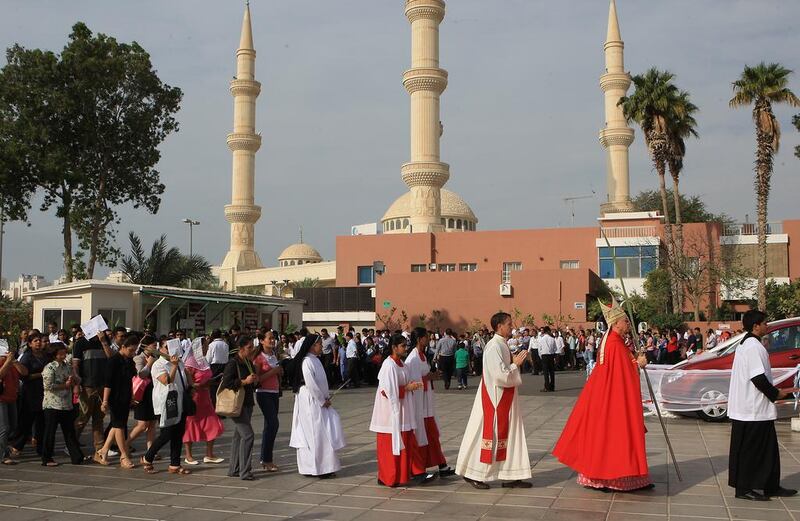This week will witness a rare juxtaposition of two festivals that will be celebrated by at least half of humanity; but almost no connection whatsoever will be made between them. At one level that is understandable.
Tomorrow, Muslims will mark Mawlid, the Prophet Mohammed’s birthday, while Friday is Christmas, still officially an important day in the Christian calendar, even if in practice it often appears to be more about making offerings to a deity of shopping than concerned with conventional devotion.
These two are the feast days of different religions and that point, obvious though it may seem, does bear underlining. The well-meaning mush we sometimes hear about all faiths being separate paths to the same end is theological nonsense, as well as being potentially extremely offensive to anyone who practises their religion rigorously.
But three faiths – Islam, Christianity and Judaism – do share similarities and principles. Islam acknowledged the commonality of the People of the Book from the start. The Quran contains numerous verses urging fair treatment of Christians and it was in the Christian kingdom of Abyssinia that many of Prophet Mohammed’s early followers were given refuge from persecution in Mecca.
Somewhat tardily, at the Second Vatican Council in 1964, Roman Catholic Christianity publicly accepted that Muslims “together with us adore the one, merciful God” – a statement Pope Francis has supported by declaring that “Christians and Muslims are brothers and sisters” and by praying in a mosque in Istanbul with his head bowed in the direction of Mecca.
But the connection goes father, much farther. For Jesus, or Nabi Isa, is one of the most important of the Islamic prophets, one who will return at the End of Days to do battle with, and conquer, Dajjal, or the anti-Christ. Of course, to Muslims he is not the son of God. But I like the way that John Sentamu, the then Archbishop of York, put it in a special issue of Britain’s New Statesman magazine which examined the idea of “Jesus: the Muslim Prophet”.
“When I visit a mosque, having been welcomed in the name of Allah and His Prophet Mohammed, peace be upon him,” said Mr Sentamu, “I respond with greetings ‘in the name of Jesus Christ, whom you Muslims revere as a prophet, and whom I know as the Saviour of the World, the Prince of Peace’.”
It would be common knowledge for Muslims to be aware that the mutual recognition of prophets goes far beyond Jesus. But I fear it is too little reciprocated the other way around, and that Mr Sentamu and his ilk are the exceptions.
I remember discussing this with European friends about 18 months ago, explaining that the Judaeo-Christian Abraham is Ibrahim to Muslims, Moses is Musa and so on. While there was a happy consequence to the subject coming up – my wife and I decided that evening that Musa would be one of our soon-to-be-born baby’s names – it all appeared to be news to our Christian friends.
Given that they were all well-educated and were living in the Middle East, I find that troubling. Ignorance and fear – and no one can doubt that this is a time of trepidation, when both mental and physical drawbridges are being raised – are a potent combination.
When a recent poll found that 30 per cent of Republicans would support bombing “Agrabah” – presumably on the grounds that to American ears it sounds Arabic, even though it is a city that exists only in the fiction of Disney’s Aladdin – it is positively dangerous that so many have barely an inkling of what binds us together.
For it is a kinship, a shared history; one that goes back thousands of years, in fact. And if more were to hold what we share in mind – or even know about it in the first place – there would surely be less hostility and division: less regarding Muslims as “other”, as unfortunately it is clear so many in Europe and America currently do, having fallen easy prey, with their lack of understanding, to populists who trade in xenophobia and prejudice.
Interfaith dialogue can often appear to be a matter of scholar speaking to scholar, of cleric to cleric. That is not without its benefits and practical applications. This week’s Economist contains a very cheering report on how monks from a Catholic monastery in frozen Minnesota are helping preserve Islamic literary treasures that were removed from Timbuktu before an Al Qaeda linked group took over northern Mali in 2012. The monks are painstakingly digitising them in a process that could take up to 30 years; but the head of the monastery’s library simply says his team will carry on the work for as long as they are welcome.
But it is not enough for academics, priests and imams to be mindful of what Islam and Christianity have in common. It is vital for this to be far more widely known. It may not fully break down the silos that are being constructed and strengthened. It may not lead everyone in Christian lands to share Pope Francis’s belief that Muslims are their “brothers and sisters”. But it would certainly help. The coming birthdays of the two great prophets would be a good place to start.
Sholto Byrnes is a senior fellow at the Institute of Strategic and International Studies, Malaysia





